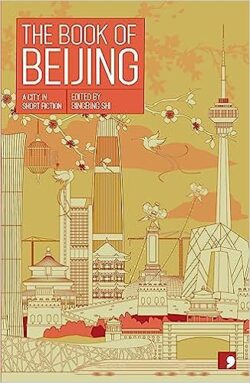The Book of Beijing, by various authors
Edited by Shi Bingbing
Stories by Qiu Huadong, Ning Ken, Xu Kun, Fu Xiuying, Gu Shi , Yu Wenling, Shi Yifeng, Xu Zechen, Wen Zhen and Han Song;
 translated by Eric Abrahamsen, Paul Harris, Jack Hargreaves, Hongyu Jasmine Zhu, Christopher MacDonald, Carson Ramsdell, Florence Taylor, Alison Sharpless, Katherine Tse, and Helen Wang.
translated by Eric Abrahamsen, Paul Harris, Jack Hargreaves, Hongyu Jasmine Zhu, Christopher MacDonald, Carson Ramsdell, Florence Taylor, Alison Sharpless, Katherine Tse, and Helen Wang.
Comma Press, 2023
Publisher's Blurb
Two former college friends run into each other on the morning train and find themselves reflecting on the very different paths their lives have taken...
A counterfeiter, forever living outside the law, starts to envy a friend who’s managed to get out of the game and establish a normal life...
A security officer in a futuristic version of Beijing West Railway Station chases down a passenger who the screens say is ‘intentionally lost’...
Beijing may be known to us, in the West, as the political powerhouse of the most populous country in the world, but to the characters in these stories it is a protean city, forever changing, evasive and difficult to read... It turns close friends into strangers, up-ends carefully thought-out life choices, and leaves next-door neighbours completely unaware of each other’s true identity. The stories collected in this anthology show people in all contexts – from wannabe protestors to future users of facial expression reading tech – desperate to stake their name on the city, as well as surprised by it at every turn.
Reading Chinese Network Reviews
Reviewed by Kevin McGeary, 23/8/23
 To celebrate going from a hermetic third-world country to a modern superpower in the space of a generation, China held its coming out party in 2008 in the form of the Beijing Olympics. Yet for a country that spends an estimated US$10 billion a year on soft power, the People’s Republic has major image problems around the world.
To celebrate going from a hermetic third-world country to a modern superpower in the space of a generation, China held its coming out party in 2008 in the form of the Beijing Olympics. Yet for a country that spends an estimated US$10 billion a year on soft power, the People’s Republic has major image problems around the world.
An unhealthy emphasis on façade over substance was shown at the opening ceremony itself, when nine-year-old Lin Miaoke mimed the song 'My Motherland' because actual singer Yang Peiyi was not deemed cute enough to appear onscreen. The following year, Facebook, YouTube and Twitter were all blocked in China, and crackdowns were launched in Tibet and Xinjiang, ramping up the oppression of marginalised ethnic groups.
This is not to say that China is incapable of criticizing itself. Over the past decade, the expression ‘中国式过马路’ ‘crossing the road Chinese-style’ has become a synonym for jaywalking among police forces and the state-controlled media. Altogether, the closest thing China offers to an honest self-appraisal is through prose fiction. Though publishing is subjected to the same censorship and controls as every other medium, the multilayered nature of fiction allows it to provide a unique glimpse into the society.
One of the challenges of writing fiction about contemporary China can be summarized in the old Mark Twain observation that truth is stranger than fiction. So much of what appears in the newspapers is so outlandish that it would never work in a short story or novel. For that reason, over the past decade China has invented a new genre called ‘ultra-unreal’, similar to how magic realism emerged from Latin America in the twentieth century.
The shortest and most exciting story in The Book of Beijing, published by Manchester’s Comma Press is ‘Reunion’ by science-fiction author Han Song, whose day job is to work for Xinhua, China’s state-owned news agency. The action takes place in Beijing West railway station during the Chinese New Year rush. Near the beginning, the narrator notes the impossible vastness of this construction and his tiny role in keeping it working: “Beijing West underwent reformulation daily. It was no longer possible to locate its centre. This was one of the reasons people became lost so frequently.”
The station is a popular suicide destination among many other things, and the unnamed protagonist oversees the various oddballs who regularly pass through: “I spotted a beggar I knew. A woman. She ran these parts, and her story had become osmosed into local lore. Originally from Northeast China, she’d drifted down to Beijing after a divorce and stayed in the station. She’d been raped by more men than I care to count and had a little boy of uncertain paternal origin.”
Despite his apparent sense of duty, the narrator himself ends up in the interrogation room. The extent to which he has been swallowed by his job becomes apparent in a claim he makes near the end: “I gazed upon the tyrannical beauty of the Station’s emblematic gates, arched across the sky like the straddle of a man’s nethers.”
The opening story ‘On the Subway’ by Fu Xiuying is the most Joycean, ending with a quiet epiphany. Near the beginning, viewpoint character Wu Tong experiences life on the titular transport, another one of modern Beijing’s technological wonders: “To be honest, she loves trains; loves those glimpses of the world outside sweeping by. Vignettes of a world, like fragments of story or snatches of a half-heard song.”
Upon encountering someone from her past, Wu Tong hears about the passing of someone she knew when she was younger. She is reminded of the fragility of life and the proximity of death, recalling the ending of ‘The Garden Party’ and ‘Her First Ball’, both by Katherine Mansfield. Upon disembarking, Wu Tong notices the ‘fresh, bright faces’ of students and detects a ‘metallic quality in the call of the cicada’. Still, she does not lose sight of her place in the rat race.
In ‘Dogshit Football’, initially skeptical protagonist Liu Ying becomes obsessed with football ahead of Diego Maradona’s appearance in Beijing during a 1996 friendly. In 2010, literary critic Terry Eagleton wrote: “If every rightwing thinktank came up with a scheme to distract the populace from political injustice and compensate them for lives of hard labour, the solution in each case would be the same: football.”
The story itself acknowledges that Maradona embodied many of the things that are problematic about football, with his ‘morally murky’ character. By the end of the story, Liu Ying discovers her inner feminist when she hears the vile chants of a football crowd. Award-winning journalist Leta Hong-Fincher has written two books about China’s burgeoning feminist movement. As this story notes, evidence is all around that a feminist awakening is long overdue.
‘Glass River’ by Qin Huadong involves an angler discovering a dead baby, and recalls the national scandal of Wang Yue in 2011. That was an incident in Foshan, Guangdong Province , when toddler Wang Yue was run over by a truck and nineteen passers-by ignored her prostrate body. She later died in hospital.
This was attributed to a culture of litigiousness in which those who attended to victims of accidents were often accused of causing them. Fiction can add extra shades of grey to an issue, and Fang Bin’s shameful inaction impacts his family life, but seeds of doubt are sewn as to whether he imagined the dead baby. It is possible that the callousness that is needed to survive in this society has sunken into his skin.
‘The MagiMirror Algorithm’ by Gu Shi recalls historian Yuval Noah Harari’s observation that present-day people are giving away data to tech companies as heedlessly as aboriginal people gave their land away to European settlers for simple trinkets. Face-recognition technology is already revolutionizing law-enforcement and other fields in China, and in this story, the main character subsumes her own judgment to it: “Apart from the more normal happiness, anger, sadness and joy, it could also detect more subtle expressions, such as indifference, doubt, recollections, concealment, and denial.” The narrator eventually discovers that, while modern technology provides a bottomless wealth of information, it takes much more than that to read people and their inner lives.
“Date at the Art Gallery” touches on the Tiananmen Square massacre of 1989, but is mostly about the ‘ant tribe’, that is Chinese born in the eighties and nineties who now have to endure squalid living conditions despite their formidable work ethic, due to a shortage of opportunities.
The main theme is the clash between youthful patriotism and the desire to improve society up against the impossibly harsh economic reality of Beijing life. Since getting into a marriage of convenience is a necessity for most, the narrator concludes: “If I didn’t leave soon I would have no choice but to marry you … the alternative was to drift with the tide. Drift, well and truly, in the ebb and flow of people and cars.”
At one stage, the narrator considers what life would be like in any other period in Beijing’s history. While not denying the poverty and misery that always existed, she concludes that life would have been easier. By the end, she is on a plane over the pacific, secretly hoping that it will be the next MH370.
With Beijing itself, as with the way Han Song describes Beijing West, it may not be possible to ‘locate its centre’, but this book makes it a worthwhile place to try to spend time with. It may be the capital of the brave new China, but most of the characters in this collection live downbeat lives. It paints a comprehensive and honest portrait of Beijing as a city whose course is impossible for any individual to influence, despite good intentions and lofty ambitions.
Reviewed by Kevin McGeary
